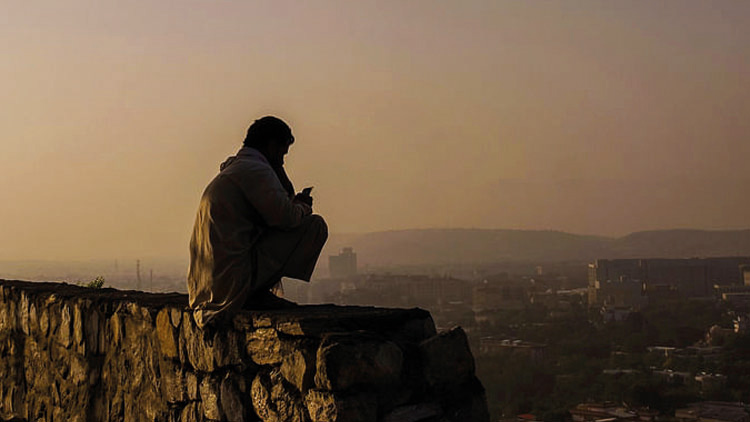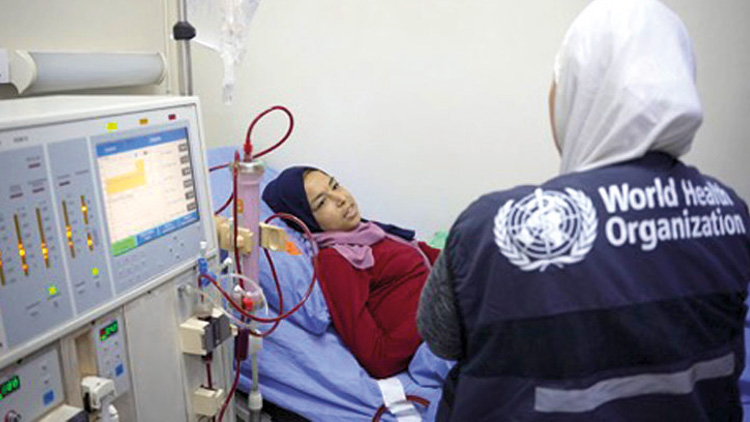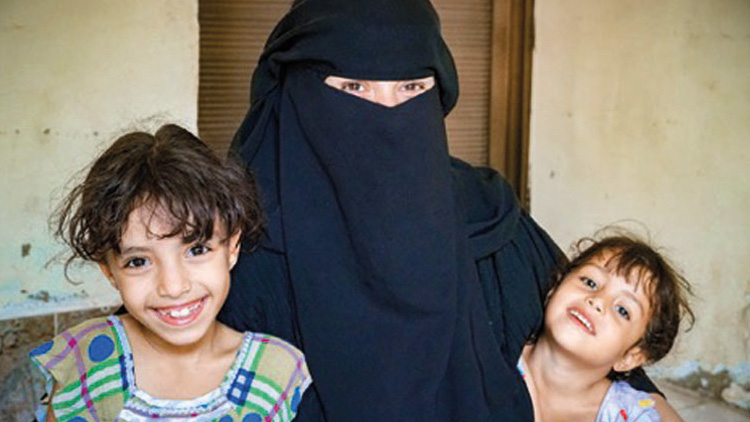

Afghanistan
Abdul, 38, from Nangarhar province, has been taking various drugs for the past 10 years. He puts this down to the pressures of poverty, stress and his failure in business.
“Drugs changed my life completely,” said Abdul, a father of 6. “I have been violent towards my children and my wife. I have shamed my entire family.”
In February 2024, Abdul admitted himself to a drug addiction treatment centre operated by WHO in Jalalabad Province. He learnt about the centre through one of the WHO-supported outreach teams working to spread awareness about the services the centre provides.
Three outreach teams managed by WHO provide community-based case-finding, follow-up and relapse prevention services. They also raise awareness of substance use disorders. Inpatients at the centre receive medical treatment and psychosocial care, including medication and counselling.
Thirty-five days after being admitted, Abdul says: “I am feeling much better. I learned that ending drug dependency is only possible if I actively participate in community-based relapse prevention services.”
The 150-bed drug addiction treatment centre for adults, funded by the European Union, provides health services to male adults. A second drug addiction treatment centre in Jalalabad has 20 beds for adolescent males.
Abdul is convinced that he never wants to go back to taking drugs and plans to draw on medical support even after he has been discharged. “My family is waiting for me to get out of the centre and join them as a new, healthy person,” he said.
Afghanistan has nearly 4 million drug users – roughly 10% of the population. Through 7 WHO-operated treatment centres across the country, 919 people completed treatment, and 23 624 were reached by outreach teams in 2023.

Occupied Palestinian territory
Nesma Ayyad, mother of 7-year-old Jana, paints a heartbreaking picture of her daughter’s deteriorating health in war-torn Gaza. With her husband absent and her home destroyed, Nesma struggles to care for her children amidst acute food and water shortages. Jana’s once vibrant life has been replaced by suffering as she battles malnutrition and its devastating effects.
"My daughter is my life, she was like a flower. Now I can see her ribs and her spine. She’s lost the ability to even sit. I have to carry her to the toilet,” says Nesma.
The dire situation in Gaza is not unique to Jana; over a million Palestinians face catastrophic hunger, with children like Jana bearing the brunt of this crisis. WHO has stepped in, operating nutrition stabilisation centres and providing vital medical supplies, but the need is overwhelming.
Jana’s story highlights the urgency of the situation. Despite initial treatment, her condition remains critical, prompting WHO to facilitate her transfer to a field hospital for further care. Nesma's hope for her daughter’s recovery is echoed by many parents in Gaza, longing for a brighter future amidst conflict and deprivation.
"I am truly happy that she’s finally going to be able to leave and receive treatment. I hope that day comes soon. I hope she comes back healthy as she was before or in an even better state," hopes Nesma.
As Nesma awaits news of Jana’s evacuation for additional treatment, her prayers are a poignant reminder of the resilience and hope that persist even in the face of unimaginable adversity. Thanks to support from the European Civil Protection and Humanitarian Aid Operations (ECHO), WHO has also supplied hospitals and health centres with medical supplies for the treatment of up to 1250 children with severe acute malnutrition.

Somalia
Amid Somalia's severe drought, Sarbina Ali, a WHO-supported community health worker in Daynile district, provides crucial health services to displaced people. Ali, a mother of 7, was selected by Banadir Health Directorate for her dedication. WHO, with funding from the Foundation for Innovative New Diagnostics (FIND), has deployed community health workers in drought-hit areas to monitor health events and provide basic care where access is limited.
Ali's work includes raising awareness about malnutrition, hygiene and diseases like diarrhoea and measles. “I feel a responsibility to assist those fleeing hunger and violence,” Ali says, ensuring displaced families receive necessary health support. A WHO-supported outreach team provides registration, treatment and medication in Daynile. Ali’s daily efforts have greatly improved health outcomes, identifying diseases early, preventing outbreaks, and providing timely medical interventions that have saved lives, especially among malnourished women and children.
One example is a pregnant woman, suffering from malnutrition and medical conditions, whom Ali brought to a WHO-supported outreach team, ultimately saving her and her baby’s life. "Ali was a God-sent help," said Fartun, a displaced woman, acknowledging WHO's services.
Mahmud Hairan, a district medical officer, notes that community-based surveillance has helped identify sick children and women early, preventing escalation and saving many lives.

Sudan
Three-year-old Mahmud weighed only 6.8 kg when he was admitted to Port Sudan Paediatric Hospital in April 2024. He showed signs of severe wasting and had persistent diarrhoea and vomiting.
At a WHO-supported stabilisation centre, Mahmud was diagnosed with severe acute malnutrition with medical complications. He received therapeutic and medical treatment, and his infection cleared within days.
Within a week, Mahmud gained 1.6 kg and was well enough to be discharged for follow-up support at the outpatient therapeutic programme managed by nutrition partners.
“I am beyond happy that my baby has recovered. The staff in this hospital were very good to us. In addition to treating Mahmud, they taught me how to avoid this type of illness in the future. I will do my best to follow what I learned,” said Mahmud’s mother.
The stabilisation centre at Port Sudan Paediatric Hospital is one of 104 centres receiving WHO emergency health and nutrition supplies. In 2023, WHO covered operating costs for 42 centres, supporting 11 centres through to April 2024, thanks to contributions from Italy, Japan, Sudan Humanitarian Fund, USAID and the UN CERF.

Syria
Aya, a 20-year-old from rural Homs Governorate, was diagnosed with kidney disease at 17 and has required life-saving dialysis 3 times a week since then.
"Learning that I would need dialysis was shocking news. I’ve had to accept that the dialysis machine is now my lifeline," said Aya. "Although my medical condition is part of my life, it's not the whole story. My dreams remain intact, and I am determined to do something meaningful with my life."
Aya lost her older brother to kidney failure 3 years ago. Her father is unemployed, and her mother is battling cancer. Like many Syrians, the family struggles financially and cannot afford health care.
"I am so grateful to the Afia Fund Association (AFA) for subsidising my dialysis treatment and medicines,” said Aya. “The centre is my second home, and the staff are like family to me."
Aya is one of many patients receiving free treatment at the WHO-supported AFA Medical Centre. WHO’s support, funded by the European Commission Directorate-General for Humanitarian Aid and Civil Protection (ECHO), enables 7 NGOs and a private hospital to deliver life-saving health services across several Syrian governorates.

Yemen
Displaced from a rural village in Taiz Governorate, Bilquis Suleiman, 37, has been in Aden, Yemen, for almost 5 years. Pregnant with her third child, both she and her husband lack steady employment. They share a small room, together with their 2 daughters, in the house of her husband’s parents.
“Although we have a very modest income, I want all of my children to be healthy, live a good life, learn and grow strong,” Bilquis says. Bilquis has received potentially life-saving health information from a community volunteer during her current pregnancy. Through a KSrelief-funded project, WHO trains and supports community health volunteers conducting house-to-house visits and group consultation sessions on nutrition, maternal health, and hygiene – to improve health literacy among the most vulnerable women.
Bilquis quickly learned that a tetanus vaccination would protect her baby from neonatal tetanus, and that taking vitamins would support her baby’s brain growth. She also came to understand how her first several days of breastfeeding provide nutrient-dense colostrum for building her newborn’s immune system, and why she should practise exclusive breastfeeding thereafter.
“All my questions were answered, and I found the community volunteer so sweet and patient,” says Bilquis. “Both as a woman and a pregnant mother, I understood the importance of the knowledge she gave me. Now I am trying my best to spread the word and provide other mothers with the same information.”
Audios
Meet Heba Bri from Syria, a surgeon who talks about her experience of the devastating 2023 earthquake



